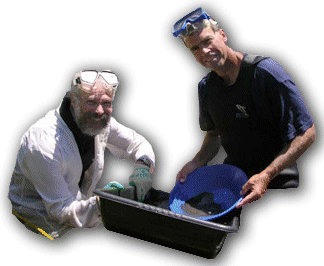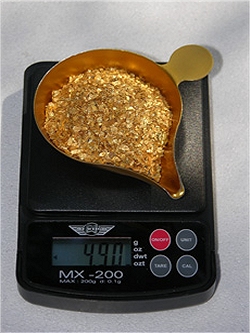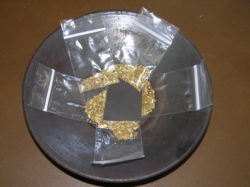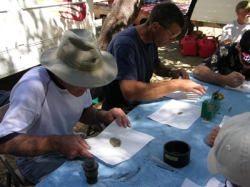By Dave McCracken
If you are going to get involved with a gold mining program, it would be wise to plan on the effect that gold will have on yourself & others!

 I once knew a very knowledgeable guy who had spent a considerable amount of time studying the characteristics of gold. One of his conclusions was that each different kind of matter (the basic elements) emits a different vibration or wavelength; and that the vibration given off by gold is a wavelength of beauty in the aesthetic band. That gold is a very pure and beautiful substance is not in question!
I once knew a very knowledgeable guy who had spent a considerable amount of time studying the characteristics of gold. One of his conclusions was that each different kind of matter (the basic elements) emits a different vibration or wavelength; and that the vibration given off by gold is a wavelength of beauty in the aesthetic band. That gold is a very pure and beautiful substance is not in question!
But wait a minute: Beauty and value are perceptions or feelings that are experienced internally by human beings, not by the material substance. A person feels that gold is rich and beautiful when he or she looks at it closely and/or comes into intimate contact with it. So we are discussing here the way people commonly feel when they have some experience with gold – or sometimes just the concept of gold. In my own (quite extensive) experience, these common reactions are: (1) admiration (can be to the extreme or worship) of the pure, aesthetic quality and richness of the substance; and, (2) the desire to have some (or all of it) for yourself; and, (3) feelings of euphoria when you actually acquire some of your own gold, especially when you have made the initial discovery in some hidden place; and, (4) the fear or worry that someone might try and take your coveted prize away from you, or that you will not receive all of what is rightfully yours; and, (5) the impulse to take necessary steps to protect your interest from others.
Please understand that I am not saying that any of this is wrong. I am just saying that these are the normal sequence of emotional reactions that play themselves out when human beings search for and discover high-grade gold deposits. Add high-grade gold into the never-ending challenge of just normal human relations, and you are potentially in for a lot of drama, unless the various relationships are structured thoughtfully and managed carefully.
Gold is a very rich and alluring substance to deal with. No-matter how much gold a person has, there never does seem to be quite enough of it to completely fulfill one’s desire for more. Very much like an addictive drug, the more gold that you have, the more you realize that it is not nearly enough to fully satisfy your desires.
Perhaps gold does not affect everyone like this. But it certainly strikes most gold prospectors this way! To those prospectors out here who would disagree with this, my answer is that you just haven’t found enough gold yet to get your juices going!
Over the years, I have heard quite a few beginning gold prospectors declare that they are immune to all of this gold fever nonsense, saying they are just into gold prospecting for the money and economic reasons. Some say they are into it just for the fun and adventure – or for something interesting to do. But I say that you really cannot be certain of your immunity or how you will react until you uncover a rich gold deposit of your own. Usually, it is the nonbelievers who lose themselves the worst once substantial amounts of raw gold come into play in a gold mining project. My own conclusion is that nobody is immune. It is just a matter of how much gold that it takes to draw you out. Usually it does not take very much!
But even if you are one of the few people on this planet who are entirely free of the emotional impact from large quantities of raw, gold (very doubtful, or you probably would not be reading this article), if you are going to get involved with a gold mining program, it would be wise to plan on the effect that gold will certainly have upon others!
Let me first start by explaining that I am not a licensed attorney, so I am not able to give out legal advice. But I am an experienced prospector and miner, and I have had the opportunity to become involved, or stand on the sidelines and watch, many, many prospecting and mining ventures make a go at it. The views expressed in this chapter are not meant to give you legal advice. You should seek out a licensed attorney for that. My purpose here is to point out some of the different situations and relationships that you may encounter by circumstance as you move forward in a gold prospecting program of your own. How you ultimately deal with the different situations is your own business. My views provided here are expressed only to give you a look in advance at the types of relationships that are commonly involved with gold prospecting.
It is very important to be careful about who you partner up with when dealing with any amount of raw gold, especially when you are planning a venture with the intention of recovering large amounts of gold.
When negotiating the various dealings which you will have with partners and/or the owners of mining property, it is very important to be extra careful to make deals which all parties are agreeable to, and which all parties will be able to stick to. Agreements should be made very clear, in writing if possible, and always before the first high-grade gold deposit is located! Ultimately, the structure of an agreement should be put into place and finalized as the next step beyond discussion of the idea between the partners – before you begin organizing or capitalizing the project.
The process of putting agreements in writing forces the persons involved to address and agree upon important details that otherwise can be just brushed over in verbal discussions. A written agreement should reflect the complete final structure of the business relationship between the people involved, leaving earlier ideas or solutions behind, creating a record of all the final details. A written agreement allows anyone or everyone involved to go back for a reminder whenever it is necessary. Everyone directly involved should sign and receive a copy of the final agreement.
It becomes more important to have a written agreement to fall back upon once a high-grade gold deposit is being developed. Because that is usually when details become more important than they were before you found high-grade.
 “Lets not worry about how we’re going to split up the gold; we’ll figure that out if and when we find any…” This might work alright on other things, but with gold it is very poor organization. Arrangements like this can very easily end up in dispute once high-grade has been discovered. Believe me: No one is looking at the world quite in the same way after a rich gold deposit is added to the picture!
“Lets not worry about how we’re going to split up the gold; we’ll figure that out if and when we find any…” This might work alright on other things, but with gold it is very poor organization. Arrangements like this can very easily end up in dispute once high-grade has been discovered. Believe me: No one is looking at the world quite in the same way after a rich gold deposit is added to the picture!
Additionally, any agreements that you make in a gold mining venture should be tailored to suit the valuable amounts of gold that you are going after. The reason for this is that if you make a deal which seems to be fair with everyone based upon developing a marginal pay-streak, and you then discover a very rich pay-streak that is producing commercial volumes of gold everyday, the deal may no longer be fair to everyone involved. But to try and revisit the inequity with your partners and to get everyone’s agreement on a new deal is almost impossible once large quantities of gold have been brought into play.
I learned this the hard way with an experience of my own. I had been dredging in an area for quite some time and had really put out a lot of time and energy to get familiar with it. Through dredging many sample holes, I was steadily working my way closer to a very large and high-grade pay-streak. But I did not know it at the time, because I had not found it yet. Man, I had gone through some real lean times prior to that! It was winter dredging with storm flows. This meant dredging in ice cold water that was also moving very fast. I was also trying to learn how to dredge at the time and trying to figure out how to find pay-streaks – all at the same time, while living in a tent out on my mining claim. And I was just starting to get pretty good at sampling. But I didn’t know that either. That is when an old friend of mine asked to come out and dredge with me for a few weeks. Well, he was a good friend, and his company sounded pretty good, so I encouraged him to come.
We worked out a 48/42% deal, with the larger share going to me. This seemed about right; because at the time my friend arrived, I was not finding paying quantities of gold, and it seemed like he ought to have a fair-sized split of the smaller amounts of gold that we found together. We agreed that I should receive a larger share, because it was my operation and he was just visiting.
We hit that rich pay-streak on the first sample hole of the first day that he arrived! It was not the first pay-streak that I had been into, but it certainly was by far the largest and best-paying – even after our split.
But the thing about it is that I was planning to put that sample hole there as my next project anyway. I had been working right into that pay-streak for months in my data collecting, hard work and sampling activities (that pay-streak and half-dozen others for that matter, which I did not know then, either). Man, were we into the gold; it was incredible!
 I had invested the better part of a year of work into learning how to dredge and find that first big deposit. That was the gold which should have paid me off for all the hard times I had stuck through up until that point. Because of the deal I made with my friend, I ended up giving almost half of the gold to someone who took no part in the hard work of finding it. Sure, he helped clean it up. But cleaning up a rich pay-streak is the fun and easy part. The amount of time and energy it takes to get familiar with an area and learn how to find pay-streaks is worth a lot more. But this is something that my buddy would never have been able to fully appreciate, because he never had to go through it. To him it was just good fortune. For me to have tried to explain differently would have caused hard feelings. He would have figured that I was just trying to squeeze out of the agreement we made together. A deal is a deal. So he received his full split from the entire pay-streak and went away very happy. Me? I learned this lesson well: Make your partnership deals based upon the high-grade amounts of gold that you are going after and the fair exchange that should go to each person when that much gold is being recovered!
I had invested the better part of a year of work into learning how to dredge and find that first big deposit. That was the gold which should have paid me off for all the hard times I had stuck through up until that point. Because of the deal I made with my friend, I ended up giving almost half of the gold to someone who took no part in the hard work of finding it. Sure, he helped clean it up. But cleaning up a rich pay-streak is the fun and easy part. The amount of time and energy it takes to get familiar with an area and learn how to find pay-streaks is worth a lot more. But this is something that my buddy would never have been able to fully appreciate, because he never had to go through it. To him it was just good fortune. For me to have tried to explain differently would have caused hard feelings. He would have figured that I was just trying to squeeze out of the agreement we made together. A deal is a deal. So he received his full split from the entire pay-streak and went away very happy. Me? I learned this lesson well: Make your partnership deals based upon the high-grade amounts of gold that you are going after and the fair exchange that should go to each person when that much gold is being recovered!
I personally try to avoid forming full partnerships where the others involved receive some portion of the net profits – meaning the money that is left over after all expenses are paid. There are several reasons for this: (1) Putting yourself in a situation whereby you have to account for and gain the approval of others for every financial expenditure can really slow things down. This situation also creates the potential for internal disagreement and conflict, as even the simplest of things can get micro-managed by a committee. (2) I do not like to sell my share of the gold unless I have to. We have gotten around this in full partnerships by splitting off some portion of the gold recovery amongst the partners and only selling the amount of gold needed to pay expenses.
If you are going to do a full partnership arrangement whereby you will find yourself having to account (to others) for every expense you make, I suggest you keep the number of people you must account to as small as possible. The more opinions, the more potential conflict.
It is easier if you create limited partnerships whereby you just pay a fixed percentage of the gross recovery to those who are participating. This way can be a bit more risky, because fixed royalties do not allow you to pay your expenses first. But at least you will not have to devote a bunch of your creative energies accounting for and justifying to others about every move you make.
You will have to make your own choices about how to structure your deals with partners. My advice? Keep it as simple as possible!
It is not unusual for a commercial miner (on a small-scale), who already has all the gear, a place to mine and all the capital needed to keep the operation going; but he still needs a helper to dredge or mine with him. Very seldom do dredge helpers or small-scale miners get paid a wage or salary. They are almost always brought in for some percentage of the recovery. While deals vary, it is most common to see this kind of limited partnership come together whereby the helper(s) (junior partner(s)) receives 25 or 30% of the gross gold recovered – right off the top. That, by the way, is a big piece of the pie, considering that the mining property and mining gear should each be allocated 10% of the gross. This only leaves around 50% of the gross for the senior partner to pay operating expenses and repairs – and have something remaining for his own time and effort. Unless the operation is recovering a good deposit, sometimes the junior partner might be the only one making any money on this kind of deal. Still, you have to offer the junior partner enough of a cut to make him interested, or you will find yourself operating a commercial mining program all by yourself! One note on this: In the case where you would take on more than a single helper, it would be necessary to work out an additional agreement how they are going to split the 25 or 30% of the gross recovery.
Sometimes it works out better to set up a split on sliding scale, whereby the percentage that goes to a junior partner is higher when the amount of gold being recovered is less. This allows the junior partner to get an immediate return for his labor that is large enough to keep him interested. Then, when higher-grade pay-dirt is uncovered, the helper’s percentage gets scaled back. Not so much that he does not benefit from the additional good fortune. But enough to allow the senior partner (who invested all the time, work & money and took most of the risk) to be rewarded for his larger investment into the program. By the way, this kind of arrangement should always be worked out in advance of finding the higher-grade pay-dirt!
It is easier, by the way, to make a generalized deal that you are not particularly happy about, or in which all the details are not fully worked out, before you get into the gold. This is actually quite common. A few friends get together to go out and have a little adventure. They are not comfortable about discussing the gritty details of a business deal together, because they do not want to make anyone else mad at them. This is easy to do if you are not sure that you are going to find gold in paying amounts, anyway.
Then, after the gold is discovered, you really wish that you spent more time doing it right in the first place! I have seen this happen time and time again. It is so easy to talk glibly with your partners about how you will not have any trouble dealing with the gold, when “the gold” is still an abstract concept that you are doubtful will ever become a reality.
It is a whole different world when you are pulling pounds and pounds of beautiful, raw gold out of the river. You feel entitled to so much because of your contribution; your partners feel the same way because of their investments; and it all adds up to more than 100% of the gold! This is when the trouble really starts within the partnership. But it also is the time when the partnership should be turning up the production!
You can lose good friends over the smallest of disagreements when it comes to gold. I have watched it happen time and time again. It is better to work it all out right at the beginning; or if you cannot agree on the terms, just don’t do the project together.
For that matter, when dealing with substantial amounts of gold, it is tough enough to prevent dissension within a group even when the best and most carefully-structured deals are made with the most ethical of partners! This is just the way it is with gold! If you do not believe me, it is just because you have not found a rich enough gold deposit, yet.
A number of things need to be discussed when structuring how two or more people will come together in a mining venture: What part will each person play in the partnership? Who is going to be the project manager? How will you acquire the equipment needed for the operation? Where is the money going to come from to pay operating expenses and repairs? Who is going to handle the money? Exactly how and when is the gold going to be split up once you get into it? How are the nuggets going to be split up? Who, if anyone else, is going to be allowed to help develop any high-grade that is found? Who, if anyone else, is even going to be allowed to know about the pay-streak before it is cleaned up? How much time is going to be put into production? How much gold will be sold to handle expenses and repairs? Where the gold is to be stored before it is split up? How long will the partnership last?
Sometimes agreements need to be modified to cope with unanticipated circumstances or some other situation that requires an adjustment. There is nothing wrong with modifying an agreement as long as everyone involved goes along with it. When this happens, the written agreement should also be modified as soon as possible, with everyone signing the modified version. It is good administration of business to make sure the written agreement continues to accurately reflect the existing arrangement between the partners.
- Here is where you can buy a sample of natural gold.
- Here is where you can buy Gold Prospecting Equipment & Supplies.
- Dealing With Mining Claims
- Integrity and Gold
- Partnerships in Mining
- More About Gold Prospecting
- More Gold Mining Adventures
- Schedule of Events
- Best-selling Books & DVD’s on this Subject





